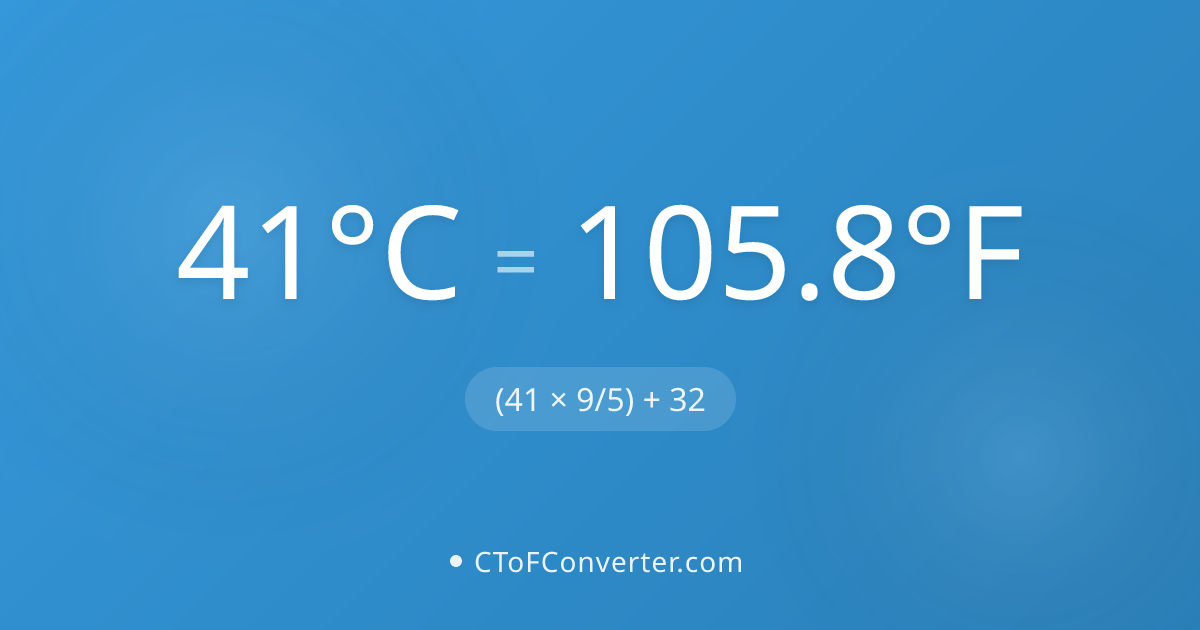Free Online Temperature Converter
41 degrees Celsius is equivalent to 105.8 degrees Fahrenheit. This specific value is frequently seen in contexts like body temperature measurements. Consult our comprehensive Body Temperature Chart & Fever Guide for accurate diagnostics.
41 C to F Conversion: Formula & Steps
To convert from Celsius to Fahrenheit, use the following formula:
Step-by-Step Calculation
- Step 1: Begin the calculation by multiplying the temperature in degrees Celsius (41) by 1.8.
Calculation: 41 × 1.8 = 73.8 - Step 2: The final step is adding the constant 32 to your previous result of 73.8.
Calculation: 73.8 + 32 = 105.8 - Result: You're done! 41°C is the same temperature as 105.8°F.

Medical Emergency: 41°C (105.8°F)
Is 41°C a Dangerous Fever?
Yes, 41°C (105.8°F) is a medical emergency known as hyperpyrexia. This extremely high temperature can lead to permanent brain damage or organ failure if not treated immediately by medical professionals.
36.1-37.2°C
38-40°C
41°C +
| Condition | Celsius (°C) | Fahrenheit (°F) |
|---|---|---|
| Healthy Range | 36.1 - 37.2°C | 97.0 - 99.0°F |
| Low-grade Fever | 37.3 - 37.9°C | 99.1 - 100.3°F |
| Medical Emergency (41°C) | 41.0°C + | 105.8°F + |
Practical Applications of 41°C (105.8°F)
41°C (105.8°F) represents hot weather conditions. Stay hydrated and seek shade.
41°C (105.8°F) is a high fever. Consult a healthcare provider if symptoms persist.
41°C (105.8°F) can be used in various laboratory and scientific processes.
Frequently Asked Questions
A 41°C fever is exactly 105.8°F. This is considered a high-grade fever (hyperpyrexia) and is a medical emergency for infants, children, and adults alike. You should seek emergency care immediately.
While not always fatal, 41°C is extremely dangerous. It is near the upper limit of what the human body can survive. Prolonged exposure to this internal temperature can cause irreversible damage to the brain and other vital organs.
- Call emergency services immediately
- Do not wait for morning to see a doctor
- Monitor for seizures or loss of consciousness
Yes, 41°C (105.8°F) is dangerously hot weather. It can cause heat stroke and severe dehydration within a short period. If the outdoor temperature reaches 41°C, stay indoors in air conditioning and drink plenty of water.
ℹ️ Editorial Note
Medical temperature data is reviewed against clinical guidelines. Fever thresholds and body temperature interpretations align with standards from major health organizations. Content is compiled based on publicly available clinical guidelines.
Sources: World Health Organization (WHO), CDC, Medical Literature.